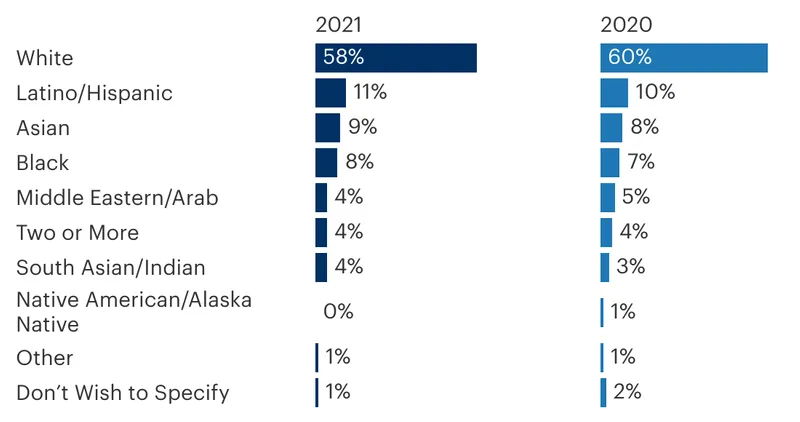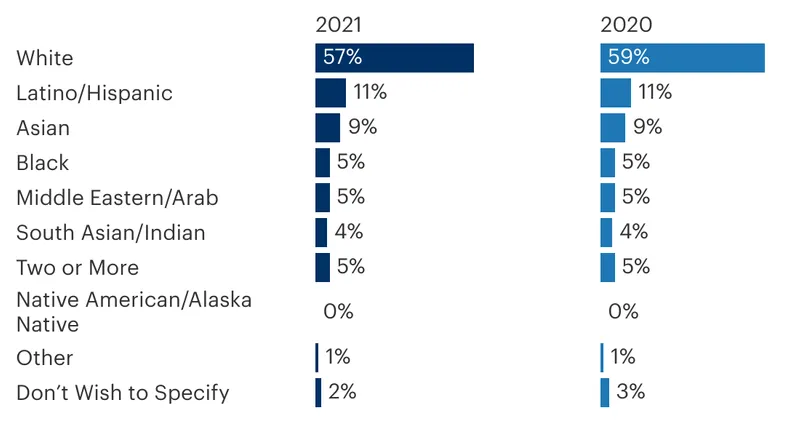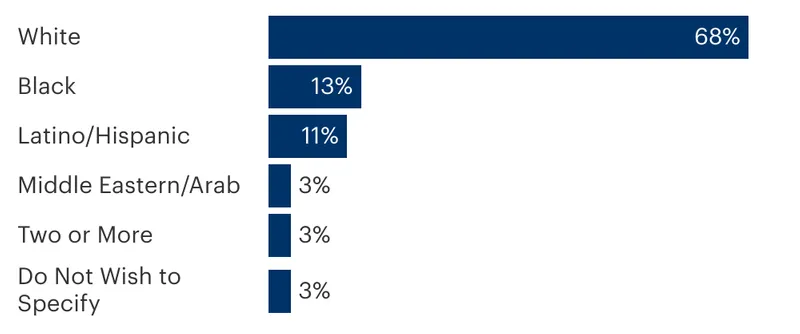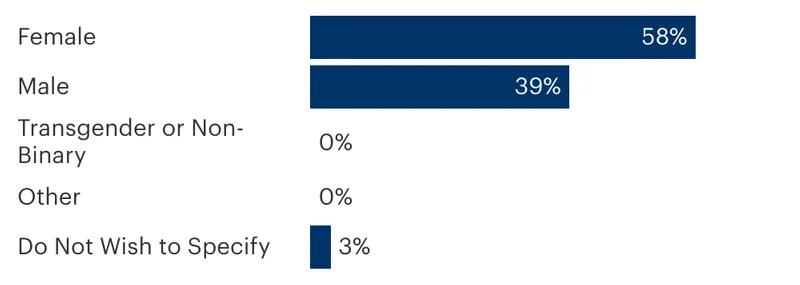ProPublica is committed to increasing the diversity of our workplace as well as of the journalism community more broadly, and each year we publish a report of what we’re doing about it. This is the report for 2021; here are all our past reports.
Our Commitment
We believe that it is crucial to fill our newsroom with people from a broad range of backgrounds, ages and perspectives. We are committed to recruiting and retaining people from communities that have long been underrepresented, not only in journalism, but particularly in investigative journalism. That includes African Americans, Latinos, other people of color, women, LGBTQ people and people with disabilities.
ProPublica has continued to expand, opening new regional units in the South and Southwest, while ProPublica Illinois has transformed to cover the Midwest more broadly. As our newsroom has grown, we also created a new masthead team to strengthen and diversify our leadership. Some of the new roles are charged with ensuring we have a robust and thoughtful hiring process, as well as focusing on building up the newsroom, overseeing staff development, and developing training and collaborations across the newsroom.
The Diversity Committee comprises more than 50 ProPublicans who volunteer their time to work on initiatives that are pitched and run by the staff. The current co-chairs are Lena Groeger, Caroline Chen and Liz Sharp.
Breakdown of Our Staff
As with last year, we tracked candidates through the application and interview process. Out of 31 jobs posted in 2020, 47% of the candidates we interviewed identified as people of color and 64% as women. Of those we hired, 58% self-identified as people of color, and 66% as women.
Compared with last year, the percentage of all ProPublica staff members who identified as people of color went up from 38% last year to 40% this year. In editorial positions, staff members who identified as people of color stayed consistent at 39%. (For context, roughly 38% of Americans are people of color.)
For the third year in a row, more women than men work at ProPublica. In editorial positions, women represented 51% of the staff.
As we’ve said since 2015, part of our commitment to diversity means being transparent about our own numbers. Here are the breakdowns:
Race and Ethnicity: All of ProPublica

Race and Ethnicity: Editorial

Race and Ethnicity: Managers

Gender: All of ProPublica

Gender: Editorial

Gender: Managers

Note: We use the term “people of color” to refer to anyone in the following groups: Asian, Black, Latino/Hispanic, Middle Eastern/Arab, Native American/Alaska Native, South Asian/Indian, or two or more races. Percentages may not add up to 100 because of rounding. Data is as of Feb. 2021.
Our Ongoing Efforts
We think about our efforts in four ways: building the pipeline (for us and for all of investigative journalism), recruiting talent, improving our hiring process, and inclusion and retention.
Adapting During a Pandemic
Some of the regular initiatives that ProPublica normally carries out, such as traveling to visit colleges and affinity conferences, were disrupted last year because of the pandemic. Not wanting to stop our programming entirely, we came up with some new virtual initiatives, as well as transitioning some of our regular programs online. Here are a couple of the new things we did last year:
- We used some leftover budget originally earmarked for conference recruiting to send first-time Black and Hispanic attendees to the virtual IRE conference, including five students and four professionals. Maya Miller organized a follow-up virtual hangout with ProPublica staffers to discuss how to use the lessons learned from the conference back in the newsroom, as well how to start shifting from daily coverage to longer-form investigative work.
- Beena Raghavendran organized a career-building webinar for “alumni” and current members of ProPublica programs (Diversity Scholarship, Data Institute and Emerging Reporters) to hear from ProPublica staff about topics including journalism ethics and navigating the newsroom as a person of color.
- We did a pilot run of an “office hours” program, in which ProPublica staff are paired up with midcareer reporters outside our organization to spend an hour offering a portfolio/resume review or workshopping an investigative story idea. We’re exploring whether to extend this initiative in future years.
- Diversity Committee Office Hours: a casual hangout on Zoom twice a month for ProPublicans to chat with the Diversity Committee co-chairs to brainstorm about diversity, equity and inclusion initiatives, ask questions about ProPublica’s ongoing DEI programs or chat about diversity-related concerns in a more intimate setting outside of the monthly committee meetings.
Building the Pipeline
- Diversity Scholarships: ProPublica has offered a scholarship program to help student journalists attend conferences, coordinated by Adriana Gallardo, Ash Ngu and Mollie Simon. This is the sixth year of the program, and we are teaming up with The Pudding to award 25 scholarships of $750 each. Because of the pandemic, there’s also the option to use the money for journalism-related expenses instead of attending a conference.
- Emerging Reporters Program: This program provides stipends and mentorship to five students who have demonstrated financial need, encouraging applications from people with diverse backgrounds. It includes a $9,000 stipend and trips to ProPublica’s New York office and a journalism conference. This is the program’s sixth year, coordinated by Talia Buford. Check out our most recent class and find out more about the program.
- ONA (Online News Association) Diversity Breakfast: An annual breakfast at the ONA conference, facilitated by Ruth Baron, Karim Doumar and Beena Raghavendran, pairs managing editors, executive editors and other leading professionals in the industry with journalists from historically underrepresented communities. In 2020, we hosted a virtual breakfast at the conference and plan to keep hosting the breakfast, whether in person or virtually, this year.
- Chicago External Mentorships: Quarterly mentorship sessions with The Real Chi, a Chicago-based learning newsroom powered by young reporters and editors ages 18 to 25 that cover the city’s West and South sides. Led by Duaa Eldeib and Tony Briscoe, workshops include sessions about public records, fact checking and investigative reporting.
- Outreach Trips: A team coordinates visits by ProPublica journalists to schools across the country, especially historically black colleges and universities and Hispanic-serving institutions with journalism programs. Contact Topher Sanders if you’d like us to visit your school virtually or in person, once we’re able to do so safely.
Recruiting and Hiring
- New Masthead Roles: In 2020, ProPublica created a new masthead team and also established a talent development director position. Buford was promoted to the role, which focuses on supporting staff development, recruitment, hiring and retention efforts. Buford reports to Ginger Thompson, who became chief of correspondents, and will also play a key role in recruiting and hiring.
- Rooney Rule: We require that hiring managers interview at least one person of color for every position. In addition, we have made it explicit that every application must be read by at least two people.
- Application Process Data Analysis: We gather and analyze data about our job candidates to better understand who’s making it to the interview stage and look at the makeup of our overall applicant pool.
- Affinity Conferences: Our conference subcommittee coordinates and encourages ProPublica presence, participation and events at affinity conferences like NAHJ, NABJ, AAJA, NAJA and NLGJA.
- Diversifying hiring for visual commissions: We survey and collect demographic data from the independent photographers and illustrators we work with to ensure that we are hiring from a diverse pool of contributors. Jillian Kumagai leads this effort.
Inclusion and Retention
- New Masthead Roles: As part of her new role on the masthead, Deputy Managing Editor Tracy Weber is focusing on how staff is deployed and making sure that projects reach their full potential. Thompson is also working to help staff grow within the newsroom, developing training and pathways for internal advancement.
- Parental Leave: In September 2020, ProPublica increased paid parental leave from 10 to 12 weeks.
- ProPublica Peer Partnership Program: This is an internal program organized by Jodi Cohen and Lisa Song that matches ProPublicans with a mentor or peer partner to meet each other, develop new skills and have someone to turn to for help navigating workplace or career questions.
- Welcoming New Hires: As ProPublica has expanded and is hiring at a rapid pace, a new subcommittee is meeting regularly to focus on new hires and come up with ways to improve the onboarding process and welcome them to ProPublica, especially in a remote fashion.
- Internal Culture: Another subcommittee is focusing on how to make the newsroom a fair and equitable environment for employees of all backgrounds and how to help staff keep growing in their careers at ProPublica.
Interested in Working Here?
Here is our jobs page, where we post new full-time positions, and here’s our fellowships page. At the bottom of either page, you can sign up to be automatically notified of when we have a job or fellowship available.





